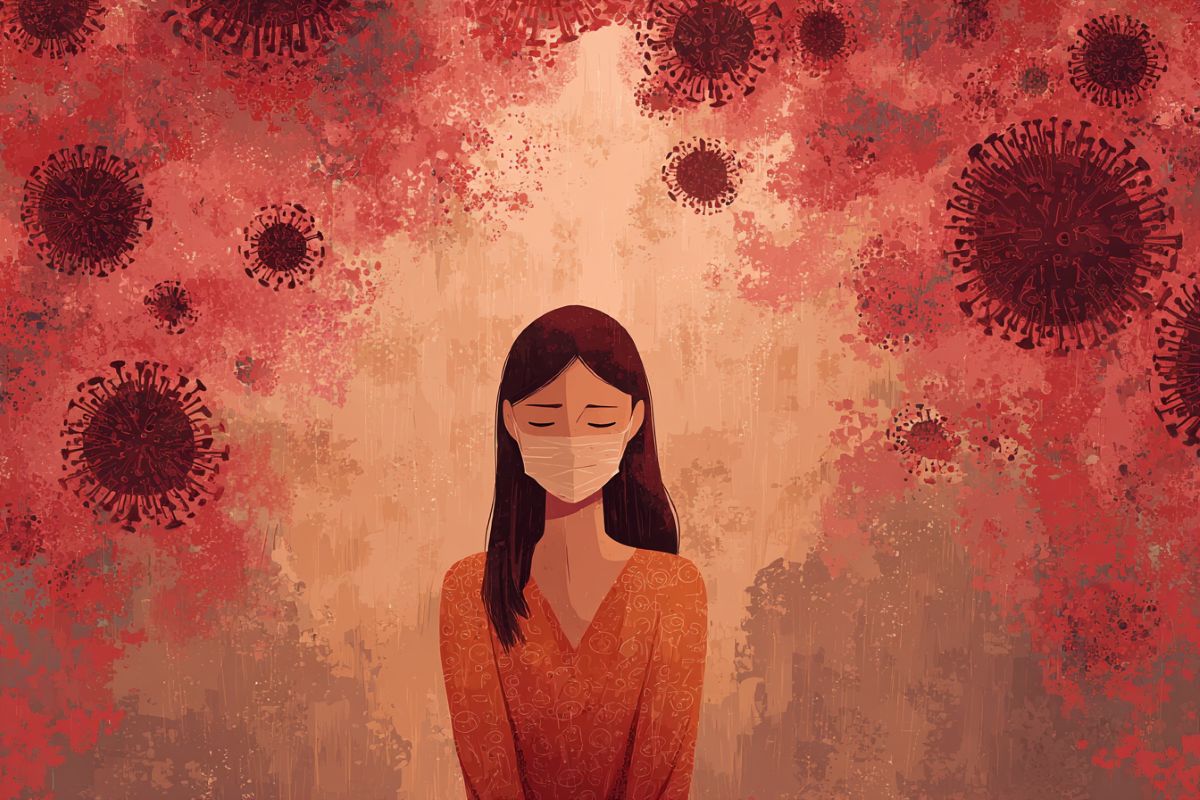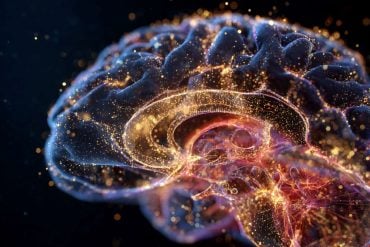Summary: New research reveals that women with long COVID show distinct biological disruptions — including gut inflammation, anemia, and abnormal hormone levels — that may explain their heightened and persistent symptoms. These findings emerged from immune, biomarker, and genetic analyses in people one year after infection.
Hormone imbalances, especially reduced testosterone in women, were strongly tied to ongoing inflammation and symptoms such as fatigue and brain fog. The study highlights new biological targets that could help guide individualized treatments for long COVID.
Key Facts
- Gut Inflammation: Women showed strong signs of gut leakiness, triggering widespread inflammation.
- Hormone Disruption: Reduced testosterone in women correlated with worse symptoms and higher inflammatory markers.
- Anemia Link: Female long COVID patients showed reduced red-blood-cell production, supporting emerging evidence of anemia as a core mechanism.
Source: University of Alberta
Research published today in Cell Reports Medicine reveals key biological differences that may explain why women with long COVID — especially those who develop chronic fatigue syndrome — tend to experience more severe and persistent symptoms than men do.
Post COVID-19 condition, or long COVID, is diagnosed when neurological, respiratory or gastrointestinal symptoms develop or continue three months or more after an acute SARS-CoV-2 infection.
The likelihood of developing long COVID is three times higher for women than men, but until now the underlying biological mechanisms driving this disparity have remained unknown.
The new research suggests potential targets for treatment that could bring relief to the 3.5 million Canadians who reported having had long COVID as of June 2023, according to Statistics Canada.
“We are focusing on a subset of patients with the most devastating symptoms that are very similar to chronic fatigue syndrome,” explains principal investigator Shokrollah Elahi, an immunology professor in the Mike Petryk School of Dentistry. “They didn’t have these symptoms prior to COVID and most had only mild COVID-19 disease, so they were not hospitalized.”
Elahi’s team carried out blood and genetic tests on 78 patients with long COVID one year after their acute diagnosis, as well as a control group of 62 people who did not develop long COVID after infection with SARS-CoV-2.
Through analysis of immune cells, biomarkers in the blood and RNA sequencing, they identified a distinct immune signature in female versus male patients.
They found evidence of “gut leakiness” in the women patients, including elevated blood levels of intestinal fatty acid binding protein, lipopolysaccharide, and the soluble protein CD14 — all signs of gut inflammation that can then trigger further systemic inflammation once they reach the circulatory system.
“This suggests that probably at the earliest stage of disease when patients get acute SARS-CoV-2 infection, there is a tendency that the females’ guts are more prone to viral infection,” Elahi says.
The team also found lower red blood cell production or anemia in the female patients. This suggests that elevated levels of inflammatory factors in females with long COVID adversely affect their blood production, Elahi says.
In addition, the researchers uncovered dysregulated sex hormones in the long COVID patients, finding reduced testosterone levels in affected women and decreased estrogen in male patients, as well as lower levels of the hormone cortisol in both.
The researchers reported that women with lower testosterone levels had higher levels of inflammation in their blood. Testosterone normally helps control inflammation, so reduced levels may make women more vulnerable to ongoing inflammatory responses, the researchers posit. Lower testosterone levels were also linked to symptoms such as brain fog, depression, pain and fatigue.
The findings suggest that hormone imbalances could play an important role in long COVID, particularly how it affects women, Elahi says.
These results are similar but not identical to what is found in idiopathic (of unknown cause) chronic fatigue syndrome, now referred to as myalgic encephalomyelitis/chronic fatigue syndrome or ME/CFS, which also disproportionately affects women. For example, anemia is not associated with chronic fatigue, but chronic inflammation is a characteristic.
The Elahi team’s findings are reinforced by another recent international study of more than 500 patients, which also reported anemia as a major biological underpinning of long COVID.
Elahi plans to further verify his findings by testing potential treatments in mice that have long COVID, and he is seeking funding for a clinical trial.
He proposes an individualized approach to treatment depending on each patient’s test results that might include anemia treatment, anti-inflammatory drugs and even sex hormones.
He also intends to continue exploring similarities between the neurological symptoms of long COVID and those associated with HIV infection.
Funding: The research was funded by the Canadian Institutes of Health Research and the Li Ka Shing Institute of Virology. Elahi’s co-authors include post-doctoral fellow Shima Shahbaz, a CIHR Research Excellence, Diversity, and Independence (REDI) Early Career Transition Award recipient; Mohamed Osman, assistant professor of medicine; Jan Willem Cohen Tervaert, professor of medicine; Rhonda Rosychuk, professor of pediatrics; Andrew Mason, professor of medicine; and Hussain Syed, graduate research fellow in medicine. Some of the work was carried out at the U of A’s Flow Cytometry Facility and Advanced Cell Exploration Core.
Elahi, Osman and Mason are members of the Li Ka Shing Institute of Virology, the Women and Children’s Health Research Institute (WCHRI) and the Cancer Research Institute of Northern Alberta (CRINA). Rosychuk is a member of WCHRI. Elahi is also a member of the Glycomics Institute of Alberta and the Alberta Transplant Institute.
Key Questions Answered:
A: The study found women show stronger inflammation, gut leakiness, anemia, and hormone disruptions — all linked to more persistent symptoms.
A: Elevated inflammatory biomarkers, impaired red-blood-cell production, and disrupted sex hormones were key differences between affected women and men.
A: Results point toward personalized therapies targeting inflammation, anemia, and hormone imbalance.
About this Long-COVID research news
Author: Michael Brown
Source: University of Alberta
Contact: Michael Brown – University of Alberta
Image: The image is credited to Neuroscience News
Original Research: Open access.
“Integrated immune, hormonal, and transcriptomic profiling reveals sex-specific dysregulation in long COVID patients with ME/CFS” by Shokrollah Elahi, et al. Cell Reports Medicine
Abstract
Integrated immune, hormonal, and transcriptomic profiling reveals sex-specific dysregulation in long COVID patients with ME/CFS
Long COVID (LC) manifests with sex-specific differences, particularly in those with myalgic encephalomyelitis/chronic fatigue syndrome (ME/CFS).
Our study reveals that female LC patients (LCF) with ME/CFS show a shift toward myelopoiesis, reduced lymphocytes, increased neutrophils/monocytes, and depleted regulatory T cells—suggesting persistent immune activation. Elevated CD71+ erythroid cells and disrupted erythropoiesis contribute to fatigue and tissue damage in LCF.
Cytokine profiling indicates a stronger pro-inflammatory response in LCF compared to males (LCM), along with markers of gut barrier dysfunction.
Hormonal analysis shows reduced testosterone in LCF and estradiol in LCM. Transcriptomic data reveal neuroinflammatory signatures in LCF, potentially explaining cognitive symptoms.
We also identify biomarkers that distinguish LCF from LCM and correlate with sex-specific clinical symptoms. Overall, LC with ME/CFS is characterized by sex-specific immune, hormonal, and transcriptional alterations, with females exhibiting more severe inflammation.
These insights underscore the need for sex-tailored interventions, including consideration of hormone replacement therapy.







